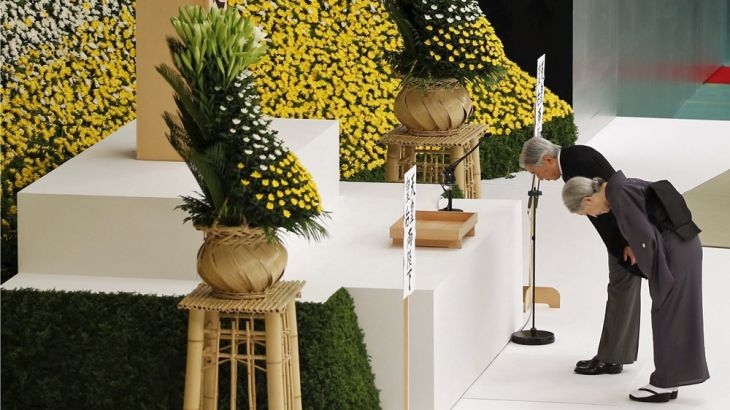Japan marks WWII anniversary amid criticism
Emperor Akihito offers “deep remorse” over war, but neighbours China, South and North Korea slam PM Abe’s statement.

Japan has marked the 70th anniversary of the end of World War II amid criticism from neighbours China, South and North Korea, which bore much of the brunt of Japan’s militarist march.
Emperor Akihito and Empress Michiko joined Prime Minister Shinzo Abe in a memorial on Saturday in Tokyo, where the Japanese monarch said he felt “deep remorse” over the war – a conflict the country fought in the name of his father Emperor Hirohito.
Reflecting on our past and bearing in mind the feelings of deep remorse over the last war, I earnestly hope that the ravages of war will never be repeated
“Reflecting on our past and bearing in mind the feelings of deep remorse over the last war, I earnestly hope that the ravages of war will never be repeated,” Akihito said.
“Together with all of our people, I now pay my heartfelt tribute to all those who lost their lives in the war, both on the battlefields and elsewhere, and pray for world peace and for the continuing development of our country.”
Blog: A Japanese imperial soldier’s crusade against war
The Japanese prime minister on Friday expressed “utmost grief”, but said future generations should not have to keep apologising for the mistakes of the past. He offered no fresh apology of his own.
The legacy of the war still haunts relations with China and South Korea, which suffered under Japan’s sometimes brutal occupation and colonial rule before Tokyo’s defeat in 1945.
Some in the Japanese media, including the Mainichi newspaper, said it was the first time the 81-year-old emperor used those words at an annual memorial on the day Japan surrendered.
Neighbours criticise
Akihito’s comments come as Japan’s neighbours said Abe’s statement on Friday was insufficient.
His remarks were welcomed by the US but blasted by China as a non-apology, while Pyongyang derided it as “an unpardonable mockery of the Korean people”.
South Korean President Park Geun-Hye said his speech “left much to be desired” and stressed the need for Japan to resolve the issue of Asian women forced to work as sex slaves for the military in Japanese wartime brothels.
Without mentioning the Japanese prime minister by name, Hua Chunying, China’s foreign ministry spokeswoman, said, “Japan should have made an explicit statement on the nature of the war of militarism and aggression and its responsibility on the wars.”
Hua also said that Japan should have made a “sincere apology” to its victims, and “made a clean break with the past of militarist aggression, rather than being evasive on this major issue of principle.”
Al Jazeera’s Harry Fawcett, reporting from Tokyo, said that even former prime minister Tomiichi Murayama noted that Abe has “essentially withdrawn” from previous statements of apology by previous Japanese leaders.
“It’s a deliberate shift,” Fawcett said, referring to Abe’s statements on Friday and Saturday about Japan’s war-time aggression.
And in a move likely to further strain relations, a pair of cabinet ministers visited on Saturday the controversial Yasukuni shrine, which neighbouring countries see as an ugly symbol of Tokyo’s militarist past.
The visits every August 15 enrage neighbouring nations, which view them as an insult and a painful reminder of Tokyo’s past aggression, including a brutal 35-year occupation of the Korean peninsula.
Abe, the grandson of a wartime cabinet minister, himself did not visit the shrine, which honours 14 Japanese leaders convicted as war criminals by an Allied tribunal, along with millions of war dead.
“As much as Shinzo Abe wants to move past beyond these issues, they do still bear heavy weight on the current politics and current state of mind in the country,” Al Jazeera’s Fawcett said.